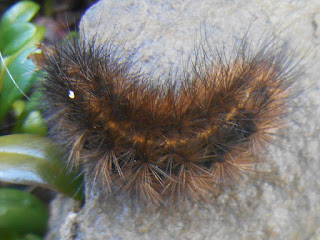 |
| Convolvulus cneorum, still in flower on 26 October, 2015 Stefen Hill, Daventry. |
Late November, and the garden is still full of colour. Shrubby Bindweed, Convolvulus cneorum, has become very popular in recent years, perhaps because gardeners are anxious to find drought-tolerant plants. It is native to coastal regions of Spain, Italy and the Balkans, but copes with our chilly conditions well if placed in a well-drained situation. Not only is it in bloom for me but there are still many flower buds waiting in the wings.
Next to it a plant of Argyranthemum frutescens is smothered in flowers. Again, this can cope reasonably in a sheltered spot despite originating from the Canary Islands. It will be interesting to see if it comes through the winter but, as it is usually employed as a summer bedding plant, I am not over-optimistic.
 |
| The Ruby Tiger caterpillar is one of the 'Woolly Bears'. Stefen Hill, 26 October, 2015 |
On a chunk of rock was a 'woolly bear' caterpillar, the larva of the Ruby Tiger, Phragmatobia fuliginosa. This is probably the commonest of all the 'tigers' and, feeding on dandelions, plantains and other garden weeds, this should not be a surprise. The caterpillar appeared to be fully grown and was therefore probably seeking a suitable place in which to pupate.
A poem which I find excessively irritating is Frances Cornford's 'To a Fat Lady seen from the Train'. Apart from being - by modern standards - very politically incorrect, it shows the poet to be wholly insensitive to any experience outside what may have been her very restricted world.
O why do you walk through the fields in gloves,
Missing so much and so much?
O fat white woman whom nobody loves,
Why do you walk through the fields in gloves,
When the grass is as soft as the breast of doves
And shivering sweet to the touch?
O why do you walk through the fields in gloves
Missing so much and so much?
The poet (I will flatter her with that description) sits haughtily in her railway carriage - no doubt first-class - and almost pities a woman strolling through a meadow, apparently assuming that this woman has a sad, narrow life. In fact the woman will observe flowers, butterflies and other insects, mosses and birds. On top of that she will have the breeze in her hair, the scents of the meadow and, with luck, the sun on her back. Meanwhile Cornford will sit there, cocooned in her carriage, only hinting at the lovely texture of the grass. Who, I wonder, is really 'missing so much and so much?'
Quite remarkably, she was the grand-daughter of Charles Darwin, a man who spent such a great deal of time wandering through the fields, presumably also missing so much!
For myself I intend to wander through the meadows for as long as I am able, missing as little as possible.

No comments:
Post a Comment